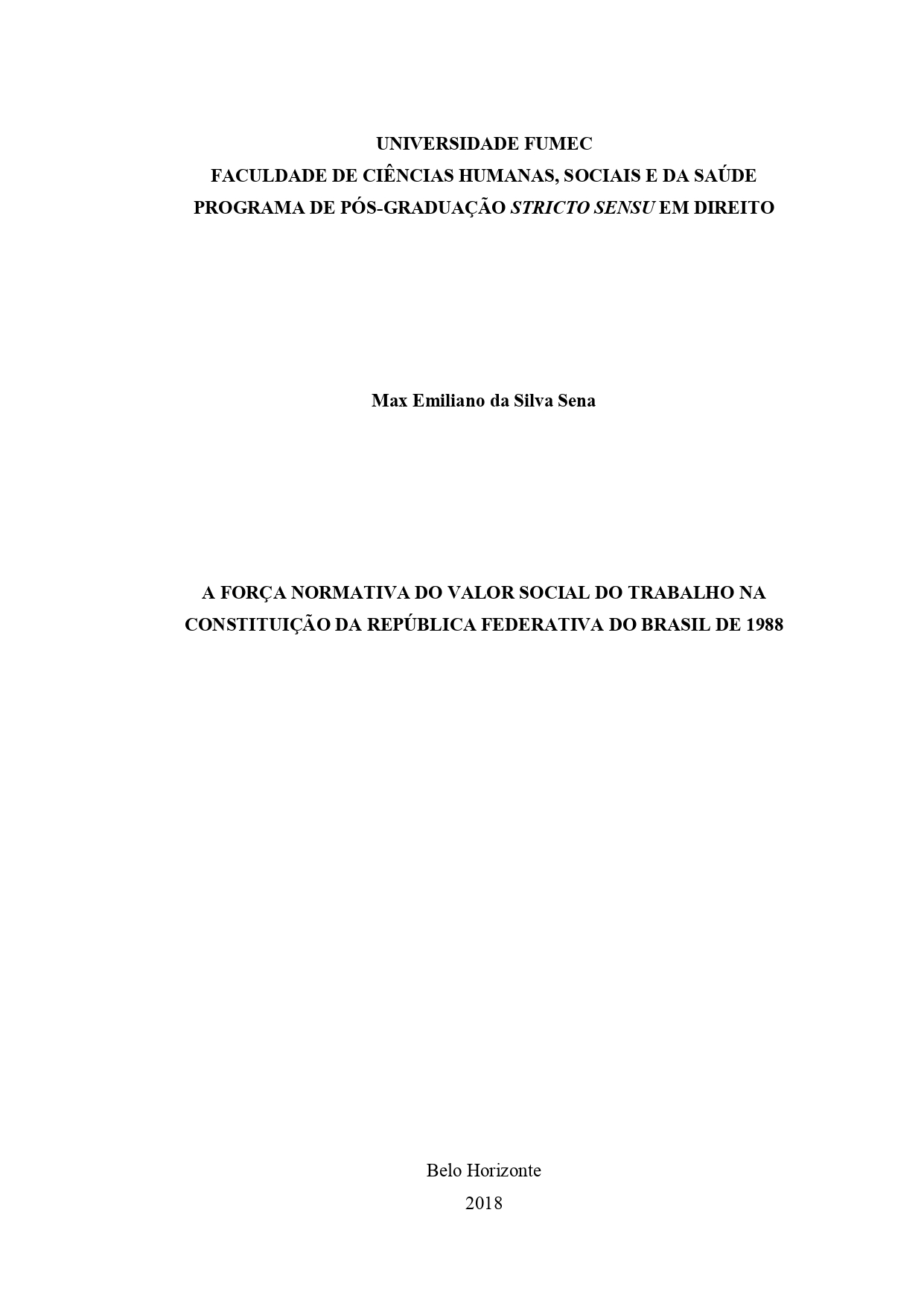A força normativa do valor social do trabalho na Constituição da República Federativa do Brasil de 1988

Data
2018Autor
Sena, Max Emiliano da Silva
xmlui.mirage2.itemSummaryView.MetaData
Mostrar registro completoResumo
O presente estudo possui como foco analisar se o princípio do valor social do trabalho revestese de natureza normativa, haja vista que a Constituição da República Federativa do Brasil de
1988 o estabeleceu como um dos fundamentos da República Federativa do Brasil, juntamente
com a soberania, a cidadania, a dignidade da pessoa humana, o valor social da livre iniciativa e
o pluralismo político. Inicialmente, do estudo das principais teorias sobre a origem do Estado e
os fins que justificaram a opção das pessoas por sua existência, conclui-se que, em resumo,
convergem para a garantia do bem comum da sociedade. No desenvolvimento do Estado
Constitucional, observa-se que as Constituições passaram a representar um repositório das
opções valorativas do povo, mediante a sua positivação na forma de princípios. No caso do
Brasil, o trabalho recebeu elevado destaque na Constituição da República Federativa do Brasil
de 1988, mediante a previsão do valor social do trabalho como fundamento da República e a
sua eleição como meio para a concretização da justiça social. A partir do marco teórico adotado,
consistente na concepção normativa de Konrad Hesse a respeito da Constituição, e do estudo
das principais teorias acerca da eficácia e da aplicabilidade das normas constitucionais, percebese que o valor social do trabalho é princípio político conformador das condutas estatais e dos
particulares, aos quais se aplica de forma impositiva, como meio de proteger o trabalho de todo
o tipo de tratamento que o considere como mera mercadoria. Tendo em vista a vinculação entre
o valor social do trabalho e a dignidade da pessoa humana, a ordem econômica no Brasil sofre
condicionamentos, pois deve gerar bem-estar, existência digna e desenvolvimento pleno em
favor do trabalhador. Ademais, na condição de garantidor do bem comum, deve o Estado, no
exercício das funções administrativas, legislativas e judiciárias, promover a concretização da
vontade constitucional materializada no valor social do trabalho. Em decisões proferidas, o
Supremo Tribunal Federal e o Tribunal Superior do Trabalho fundamentaram-se no valor social
do trabalho nas razões de decidir. Para o desenvolvimento deste trabalho, utilizou-se o método
de abordagem indutivo e a pesquisa dogmático-jurídica de natureza bibliográfica, por meio da
consulta de obras de autores nacionais e estrangeiros, legislação nacional e estrangeira, teses e
dissertações a respeito do tema e jurisprudências. The present study is focused on analyzing whether the principle of social value of work has a
normative nature, since the Constitution of the Federative Republic of Brazil 1988 establishes
it as one of the foundations of the Federative Republic of Brazil, along with sovereignty,
citizenship, the dignity of the human person, social value of free entrepreneurship and political
pluralism. Initially, studying the main theories about the origin of the State and the reasons why
people opted for its existence, is possible to conclude, in short, that all converges to guarantee
the common good of society. In the development of the Constitutional State, it is observed that
the Constitutions have come to settle options to the values of the people, through positivation
them in form of principles. In 1988, during the Brazil Constitutional convention, work was
highly highlighted, the social value of work became one of Republic´s foundations and it was
elected as a means to achieve social justice. Based on the theoretical framework adopted in the
Konrad Hesse's Constitutional normative conception, and the study of the main theories about
the effectiveness and applicability of constitutional norms, it is perceived that the social value
of work is a political principle that conforms the public and private conduct, and it is applied in
a mandatory way, as a means to protect the work of any type of treatment that considers it as a
mere commodity. The economic order in Brazil suffers from conditioning when it refers to the
link between the social value of work and the dignity of human person, since it must generate
welfare, a dignified existence and full development in favor of the workerman. In addition, as
a protector/supporter of the common good, the State, in the exercise of administrative,
legislative and judicial functions, should promote the realization of the constitutional will
embodied in the social value of work. Some final decrees granted by the Federal Supreme Court
and the Superior Labor Court were based on the social value of work in the reasons for deciding.
For the development of this work, we used the method of inductive approach and dogmatic
legal research of bibliographical nature, through the consultation of works by national and
foreign authors, national and foreign legislation, theses and dissertations on the subject and
jurisprudence.
